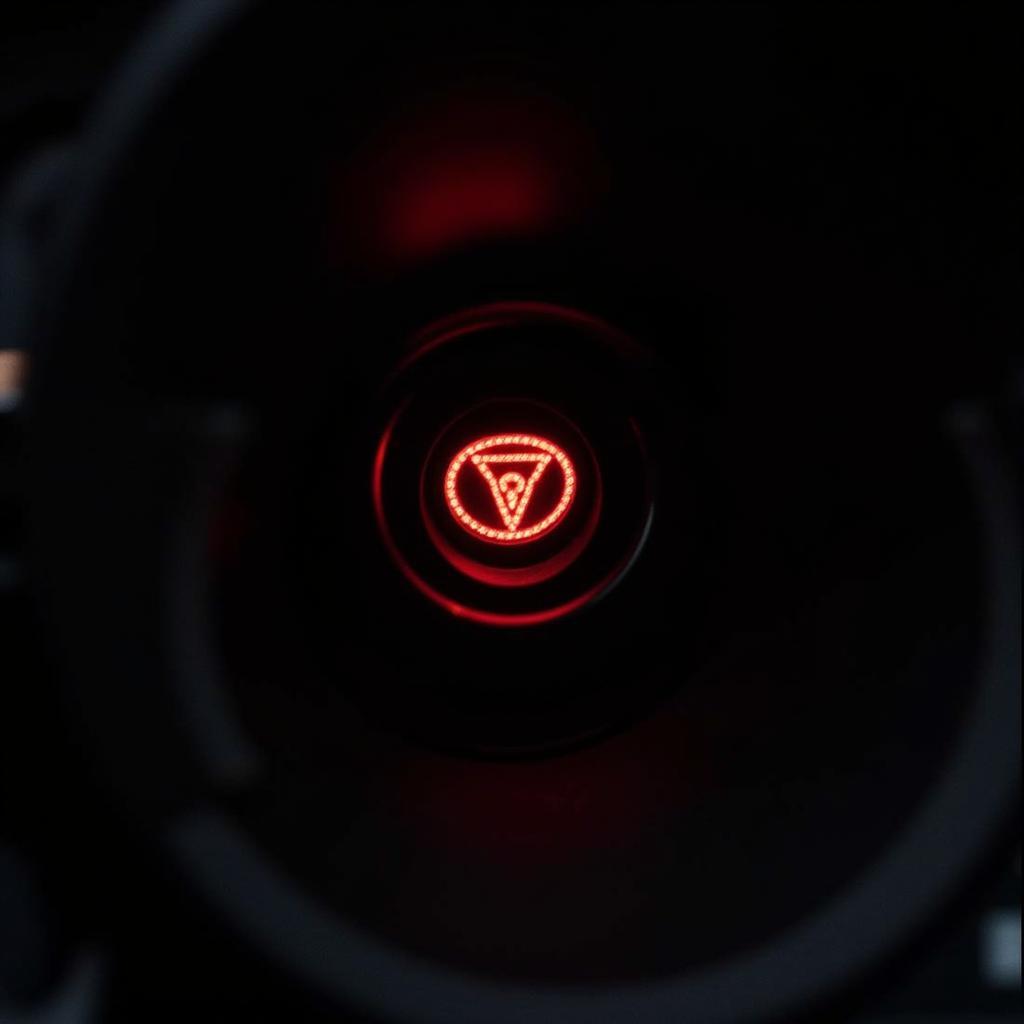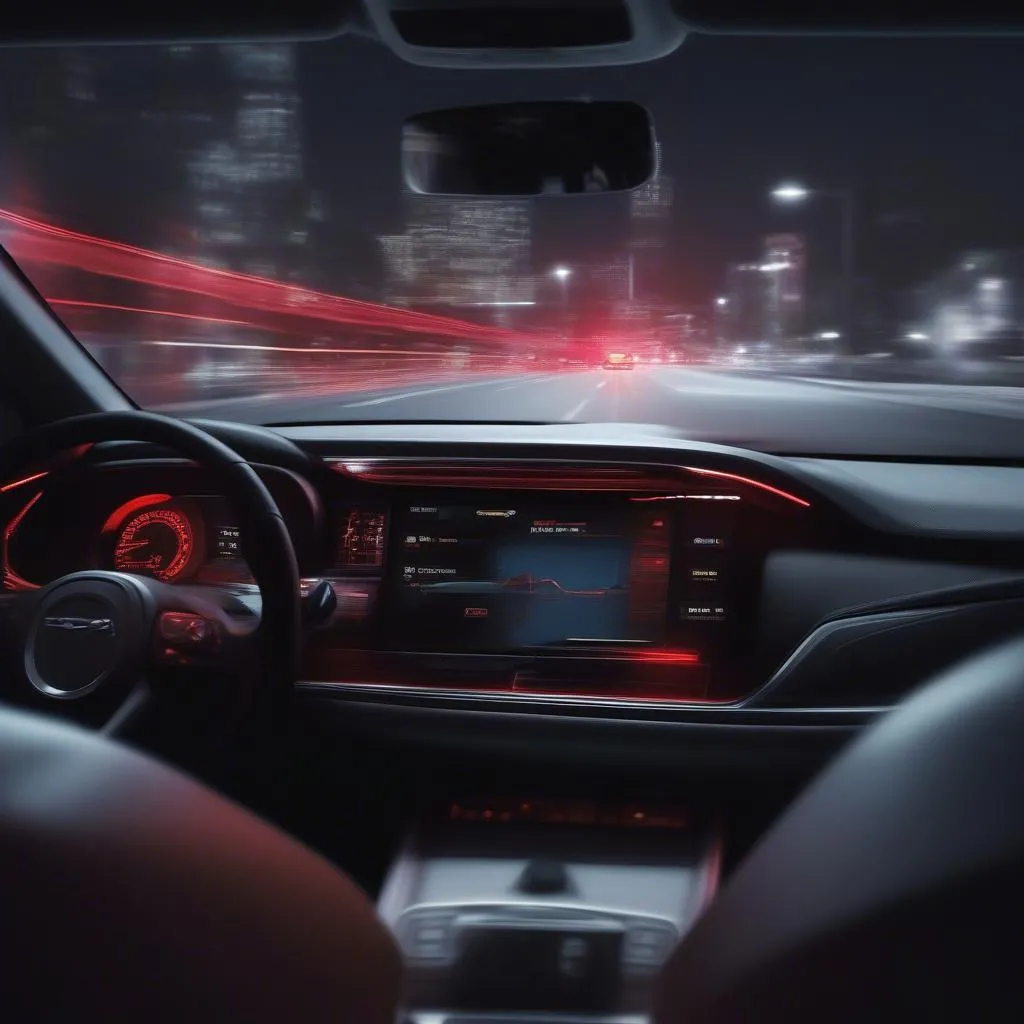A flickering brake warning light on your dashboard can be a nerve-wracking experience. While it might be tempting to dismiss it as a minor electrical glitch, understanding the potential causes is crucial for your safety and the longevity of your vehicle. This article delves into the common reasons behind an intermittent brake warning light and provides insights into diagnosing and addressing the issue.
Why Does My Brake Warning Light Flicker?
The brake warning light is designed to illuminate when your vehicle’s onboard computer detects an issue within the braking system. When it goes on and off intermittently, it signals a potential problem that needs immediate attention. Here are some common culprits:
- Low Brake Fluid Level: This is one of the most frequent reasons for the brake warning light to flicker. A leak in the brake lines or a worn-out master cylinder can lead to a drop in brake fluid, triggering the warning light.
- Faulty Brake Pad Sensor: Many modern vehicles come equipped with brake pad wear sensors. These sensors are designed to complete an electrical circuit when your brake pads wear down to a certain level, turning on the warning light. A malfunctioning sensor or loose wiring can cause the light to come on and off intermittently.
- Worn Brake Pads: Even without sensors, excessively worn brake pads can trigger the brake warning light. As the pads thin out, the brake caliper pistons need to extend further to engage the brakes, potentially activating the brake fluid level sensor and illuminating the warning light.
- Issues with the ABS System: A problem with your Anti-lock Braking System (ABS), such as a failing wheel speed sensor or a malfunctioning ABS module, can also trigger the brake warning light. This often requires a professional mechanic with diagnostic tools to pinpoint the specific issue.
- Loose or Corroded Wiring: Over time, the electrical connections within your braking system can become loose, corroded, or damaged. This can disrupt the signal to the brake warning light, causing it to flicker intermittently.
How to Troubleshoot an Intermittent Brake Warning Light
Before rushing to a mechanic, there are a few troubleshooting steps you can take to identify the root cause of the problem:
- Check Your Brake Fluid Level: Park your car on a level surface and locate the brake fluid reservoir under the hood. The reservoir will have “Min” and “Max” markings. If the fluid level is below the “Min” mark, it indicates a leak or the need for a brake fluid top-up.
- Inspect Your Brake Pads: Take a visual inspection of your brake pads through the spaces between the wheel spokes. If you notice the brake pad material is significantly worn down or you can’t see much pad material at all, it’s time for a replacement.
- Check for Visible Leaks: Examine the area around your brake calipers, brake lines, and the master cylinder for any signs of fluid leaks. Brake fluid is typically clear to amber in color and has a slightly oily texture.
When to Seek Professional Help
If you’ve checked the brake fluid, inspected the brake pads, and haven’t found any obvious leaks, it’s essential to consult a qualified mechanic. Issues with the ABS system or electrical components require specialized diagnostic tools and expertise.
“Ignoring a flickering brake warning light can lead to serious safety hazards,” says John Smith, a certified automotive technician at XYZ Auto Repair. “It’s always best to err on the side of caution and have a professional diagnose the problem.”
Preventing Future Brake Warning Light Issues
Regular vehicle maintenance is crucial for preventing brake problems. Here are some preventive measures:
- Regular Brake Fluid Flush: Brake fluid absorbs moisture over time, reducing its effectiveness. It’s recommended to flush your brake fluid every 2 years or as recommended by your vehicle’s manufacturer.
- Timely Brake Pad Replacement: Don’t wait for your brake pads to wear down completely before replacing them. Follow the manufacturer’s recommended replacement intervals or consult a mechanic for an assessment.
- Address Brake Noises Promptly: Screeching, grinding, or squeaking sounds during braking often indicate brake pad wear or other brake problems. Address these issues promptly to prevent further damage and potential safety hazards.
Conclusion
An intermittent brake warning light is a serious issue that should never be ignored. While a simple fluid top-up or brake pad replacement might be the solution, more complex problems require professional diagnosis and repair. By understanding the potential causes and taking proactive measures, you can ensure the optimal performance of your braking system and, most importantly, your safety on the road.
FAQs
-
Can I still drive my car with the brake warning light on?
It’s highly discouraged to drive your car with the brake warning light on, especially if the brake fluid is low or you suspect a serious issue. This could lead to brake failure and a dangerous situation. -
How much does it cost to fix a brake warning light issue?
The cost of repair varies depending on the underlying cause. A simple brake fluid top-up is inexpensive, while a brake pad replacement or ABS module repair can be more costly. -
How often should I check my brake fluid?
It’s a good practice to check your brake fluid level at least once a month and more frequently if you notice any changes in your brake pedal feel or hear unusual noises during braking. -
Can a bad battery cause the brake warning light to come on?
While a bad battery can cause various electrical issues in your car, it’s unlikely to directly cause the brake warning light to come on. The brake warning light is typically associated with problems within the braking system itself. -
Is it safe to add brake fluid myself?
If you’re comfortable working on your vehicle and are confident in your abilities, you can add brake fluid yourself. However, it’s crucial to use the correct type of brake fluid specified in your owner’s manual and to avoid overfilling the reservoir. If you’re unsure, it’s always best to consult a mechanic. Remember that simply adding brake fluid won’t address the underlying issue causing the low fluid level, such as a leak. It’s crucial to have the system inspected and repaired by a professional.


